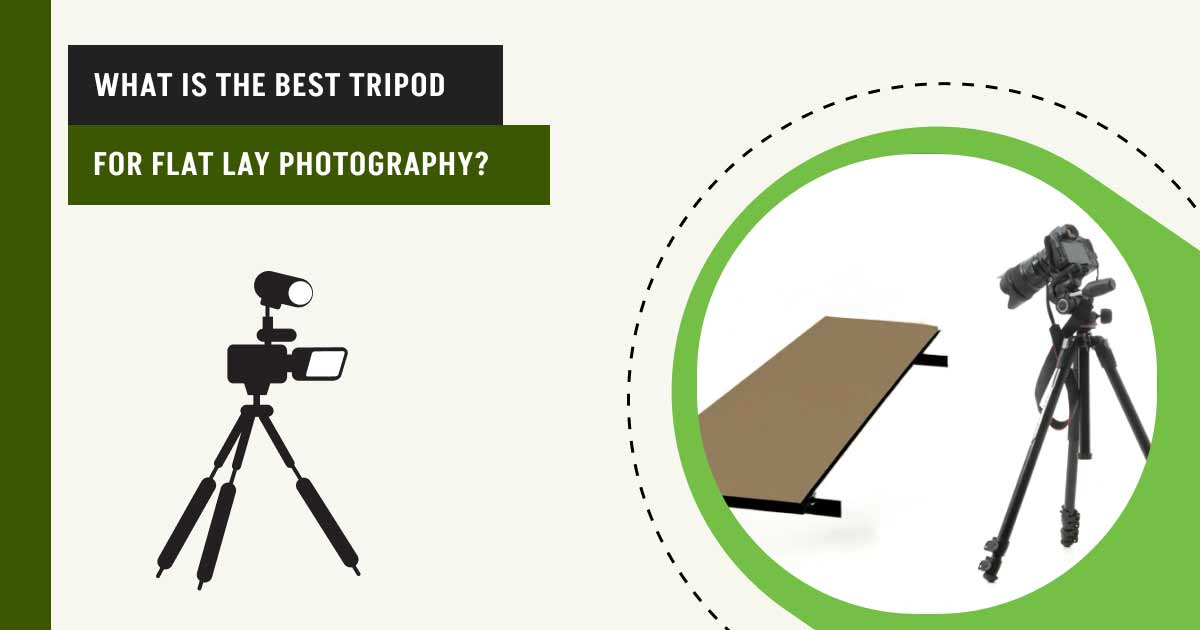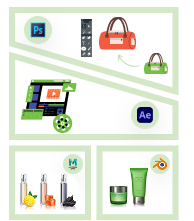The best tripod for flat lay photography is the one with stability to control camera shake, portable weight, adjustable height range, and leg flexibility, ensuring a sharp and focused image for commercial-grade photography. High-quality tripods hold the camera in a steady position and allow comfortable photo shooting. Professional photographers recommend choosing the right camera stand for flat lay photography based on material quality, footing stability, customizable payload height, flexible orientation, and a balancing device. Taking those factors into consideration, the 10 best tripods for flat lay photography are as follows.
- Manfrotto 055 Aluminum 3-Section Tripod with Horizontal Column (MT055XPRO3)
- Vanguard Alta Pro 263AP Aluminum Tripod
- K&F Concept SA254T1 94″ Camera Tripod
- Neewer 2-in-1 Aluminum Alloy Camera Tripod
- Manfrotto MT190XPRO4 Aluminum 4-Section Tripod
- K&F Concept SA254T3 74-inch Camera Tripod
- Manfrotto 190 Go! M-Series Aluminum 4-Section Tripod
- Manfrotto Befree GT XPRO Aluminium Camera Tripod
- Gitzo GT2541EX Series 2 Explorer
- KODAK PhotoGear 2-in-1 Tripod & Monopod with Remote
What you’ll learn in this article
- 1 1. Manfrotto 055 Aluminum 3-Section Tripod
- 2 2. Vanguard Alta Pro 263AP Aluminum Tripod
- 3 3. K&F Concept SA254T1 94″ Camera Tripod
- 4 4. Neewer 2-in-1 Aluminum Alloy Camera Tripod
- 5 5. Manfrotto MT190XPRO4 Aluminum 4-Section Tripod
- 6 6. K&F Concept SA254T3 74-inch Camera Tripod
- 7 7. Manfrotto 190 Go! M-Series Aluminum 4-Section Tripod (MT190GOA4US)
- 8 8. Manfrotto Befree GT XPRO Aluminium Camera Tripod
- 9 9. Gitzo GT2541EX Series 2 Explorer
- 10 10. KODAK PhotoGear 2-in-1 Tripod & Monopod with Remote
- 11 Why Do You Need a Tripod for Flat Lay Photography?
- 12 How to Choose the Best Tripod for Flat Lay Photography?
1. Manfrotto 055 Aluminum 3-Section Tripod
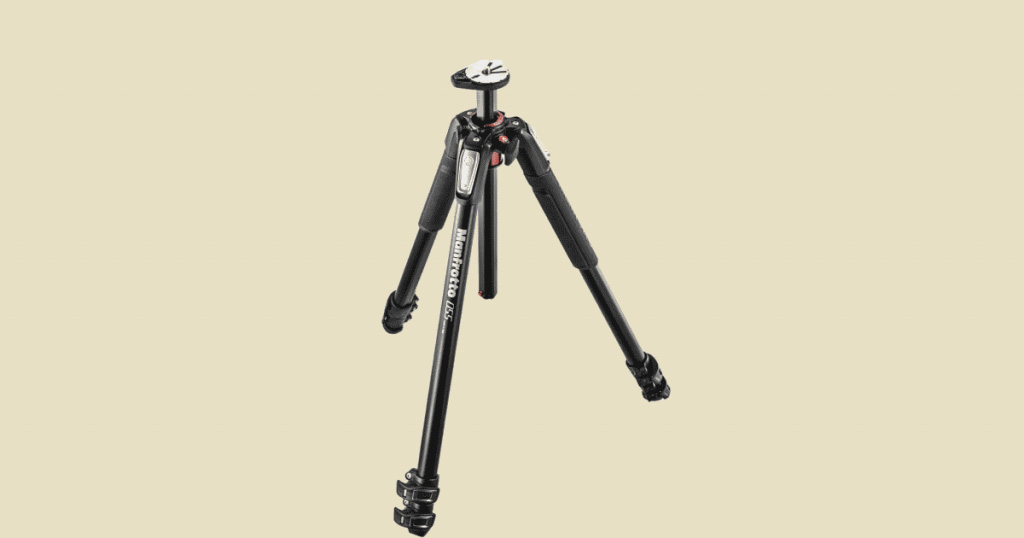
The Manfrotto 055 (MT055XPRO3) is one of the most popular and best flat lay tripods among professional users for its durability. The aluminium-made tripod has a 90° centre column that can be extended horizontally and vertically with a finger, even with an attached camera. Its locking system is smooth enough to extend the legs single-handed. Another distinctive feature is that users can move the bubble level in the center column as they see fit.
Key Specifications
- Adjustable height range: 9cm – 170cm
- Weight: 5.5 pounds
- Weight Capacity: 9kg
- Material: Aluminum
- Number of leg sections: 3
- Color: Black
| Pros | Cons |
| Quick Power Levers (QPL) guarantee strong locking of each section. | The counterbalance hook is absent |
| QPL makes it more rigid and stable | Need to buy heads separately |
| A wide range of leg angles is available | |
| The bubble level rotates freely for precise framing | |
| The horizontal column can be extended and shortened | |
| A link connector is available for attaching accessories. |
2. Vanguard Alta Pro 263AP Aluminum Tripod
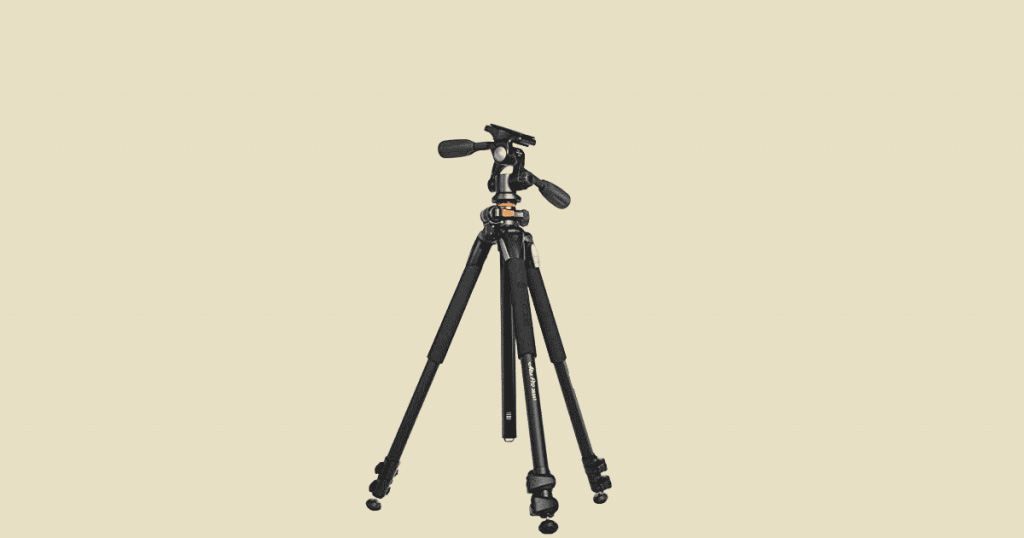
The Vanguard Alta Pro 263AP is one of the most versatile flat lay camera stand for its multi-angle central column system, which can rotate horizontally and vertically from 0° to 180°. Its lightweight and compact size make it easy to operate and carry. Moreover, the three-way pan head makes panning and tilting smooth enough to make the framing precise.
Key Specifications
- Adjustable height range: 42cm – 151.5cm
- Weight: 2.6kg
- Weight capacity: 5g
- Material: Aluminum, Rubber
- Number of leg sections: 3
- Color: Black, Silver
| Pros | Cons |
| Multi-angle central column system rotates 360° and can be moved from 0° to 180° | Screws can get rusted if used in a wet condition |
| Legs can be set up at 3 angles: 25°, 50°, and 80° | Need to be extra careful as the plastic part that locks the central column is quite flimsy |
| Premium magnesium die-cast canopy with a bubble level for position accuracy | |
| Vibration and shock controllers have been included | |
| A detachable hook is given for holding camera gear and extra weight | |
| Rubber feet, including spikes for stability | |
| 3-way fluid pan head with two handles |
3. K&F Concept SA254T1 94″ Camera Tripod
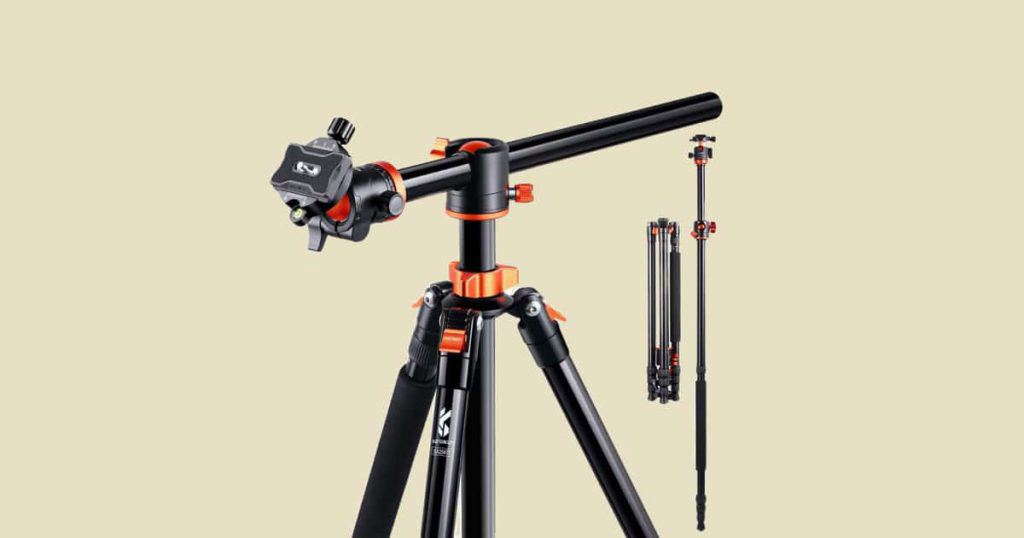
K&F Concept SA254TI has a great height of 94 inches, which makes it the most suitable flat lay camera tripod. This tripod will support your product photography even if you are shooting on a table, which is something that the majority of other tripods can’t do. Despite being so tall, it can be folded down to a smaller size, making it easier to transport in the tote bag that is provided to safeguard it from scratches and other damage. Additionally, the ball head and the central column can rotate 360° and are sturdy enough to support your bulky camera and lenses and keep them secure.
Key Specifications
- Adjustable height range: 27 inches – 94 inches
- Weight: 2 kg
- Weight Capacity: 10kg
- Material: Aluminum
- Number of leg sections: 3 legs, each with 4 sections
- Color: Black and Orange
| Pros | Cons |
| The central column can be moved from 0° to 180° and rotated 360° | Counterweight should be used to maintain the balance if extended to the maximum height |
| Robust stability | The tripod needs more room when fully extended |
| A detachable ball head can support up to 10kg | |
| It has two center columns: inner and outer | |
| Both the inner and outer center columns can be adjusted independently | |
| Spiral locking knobs make height adjustment effortless | |
| The transverse central column allows shooting at a low angle. |
4. Neewer 2-in-1 Aluminum Alloy Camera Tripod
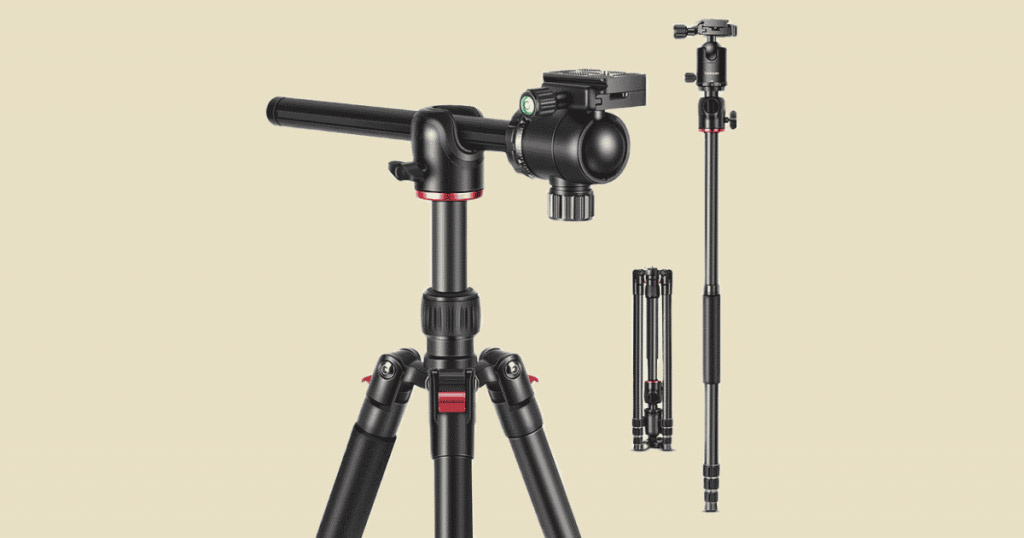
The Neewer 2-in-1 aluminum alloy camera tripod is a durable and solid multifunctional transverse tripod. The 360° rotation capability of the center column and the ball head makes it one of the most commonly used tripods for flat lay photography. Besides, it comes with a portable carrying bag that protects the tripod from damage.
Key Specifications
- Compatible device: DSLR
- Maximum height: 165cm
- Weight: 7.16 Pounds
- Weight capacity: 22 pounds or 10 kg
- Material: High-Density Aluminum Alloy
- Head type: Ball heads
- Leg lock type: Twist lock
- Number of leg sections: 4
| Pros | Cons |
| A link connector is given for attaching accessories. | Sandbag is not included |
| The center column can rotate 360° horizontally | Balancing bubble works only if the camera is 90° from vertical |
| A hook is attached to the center column to hang a sandbag for stability | It is advised to handle knobs and legs gently due to their sensitivity. |
| Leg grips made of dense sponge insulate against extreme temperatures. | |
| The non-slip foot design assures safety and stability | |
| Legs lengths are adjusted by spiral twist locking knobs | |
| Bubble level helps to balance | |
| The ball head rotates 360° | |
| It can be used as a monopod |
5. Manfrotto MT190XPRO4 Aluminum 4-Section Tripod
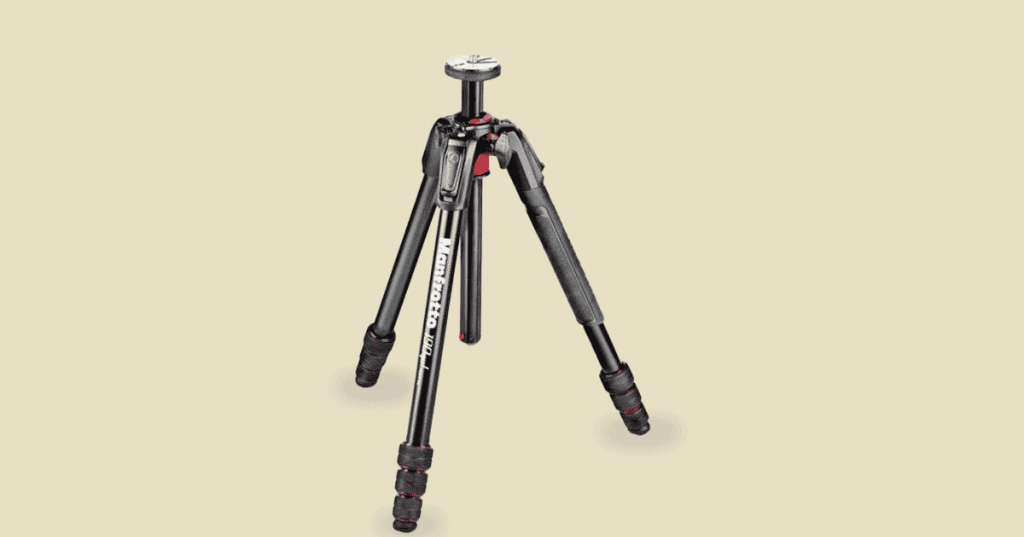
Manfrotto MT190XPRO4 is the best choice for photographers who need to travel extensively, as the four-leg sections make the tripod more compact. The most convenient feature is that the 90° central column can be operated with only one finger. The quick power lock is strong, smooth, and fast enough to be extended with one hand. Additionally, the easy link plug allows connecting lights to enhance the lighting for flat lay photography.
Key Specifications
- Adjustable height range: 8cm – 160cm
- Weight: 4.6 pounds
- Weight Capacity: 15.4 Pounds
- Material: Aluminum
- Number of leg sections: 4
- Color: Black
| Pros | Cons |
| Rotating bubble level | Only two legs have rubber grips |
| Quick Power Lock system ensures fast setup | Need to buy heads separately |
| Link plug for connecting accessories | |
| Q90 column gives excellent positioning | |
| Rubber grips on the legs make it easy to hold |
6. K&F Concept SA254T3 74-inch Camera Tripod
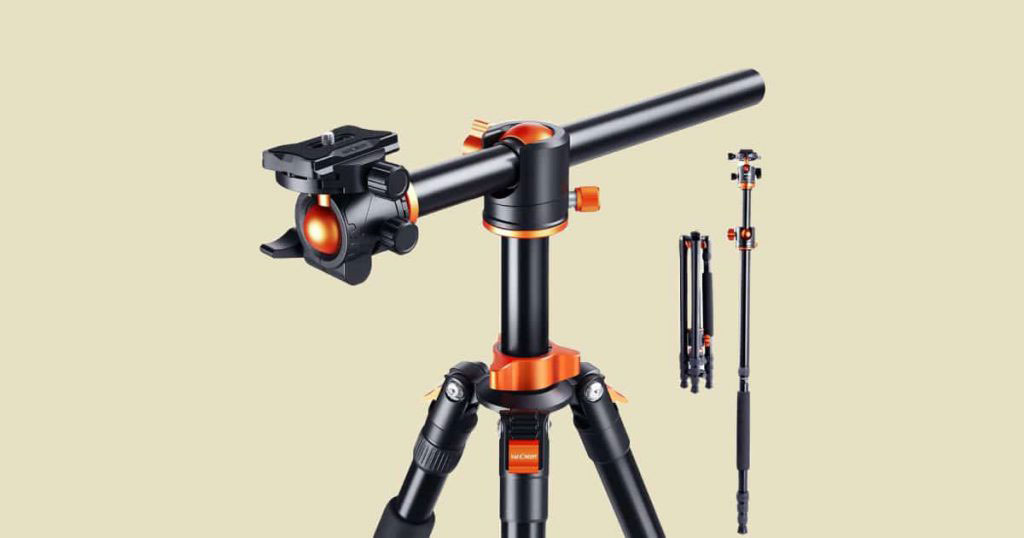
K&F Concept SA254T3 is one of the tallest and most versatile camera tripods available on the market. The most intriguing feature is the ability of the legs to collapse and invert around the ball head, making it the ideal size for travel. Despite being lightweight, it is pretty sturdy. The 360° makes this a good overhead tripod.
Key Specifications
- Adjustable height range: 61cm/24 inch – 189cm/74 inch
- Weight: 4.1 Pounds
- Weight capacity: 22 Pounds or 10kg
- Material: Aluminum Alloy
- Number of leg sections: 4
- Color: Black, Orange
| Pros | Cons |
| The 25mm diameter aluminum alloy tube is strong enough to support up to 10kg | Not compatible for use in wet conditions |
| The central column can be moved from 0° to 180° and rotated 360° horizontally | Balancing a telephoto lens requires a tripod mount ring |
| The metal ball head can be rotated 360° | |
| Bubble level helps to detect the position accuracy | |
| 4 section legs make it both compact and flexible | |
| Has a detachable monopod |
7. Manfrotto 190 Go! M-Series Aluminum 4-Section Tripod (MT190GOA4US)
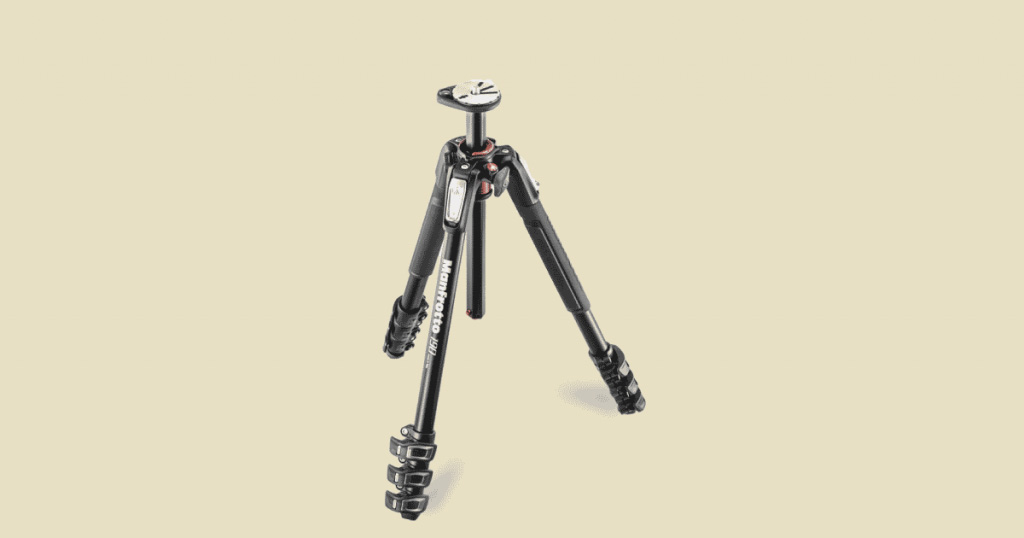
Manfrotto’s 190 Go! M-Series is another excellent choice. Its capability of using the central column at every possible angle makes it versatile for professional photography. Its four-legged sections enable compact folding. The tripod’s sturdy structure supports more than 15 pounds and has an easy link for connecting camera accessories.
Key Specifications
- Adjustable height range: 3.54 inches – 59.84 inches
- Weight: 3.66 pounds
- Weight capacity: 15.43 pounds or 7kg
- Material: Aluminum
- Number of leg sections: 4
- Color: Black
| Pros | Cons |
| M lock mechanism speeds up the extending process | The bubble level is on the head rather than the tripod |
| Accessories can be connected through an easy link | |
| The center column can be set at a 90° angle parallel to the ground | |
| Easy to carry |
8. Manfrotto Befree GT XPRO Aluminium Camera Tripod
The Manfrotto Befree GT XPRO camera is a small and sturdy tripod. To take standard flat lay photos, it offers rotation of the central column at 90 degrees. It is a flexible lens and fully opens by moving the legs up and down. You can move and extend every single leg if you need to shoot at ground level or perpendicular to the ground.
Key Specifications
- Adjustable height range: 8.9 cm to 164 cm
- Weight: 2 Kilograms
- Weight capacity: 12 Kilograms
- Material: Aluminum
- Number of leg sections: 3 legs, each with 4 adjustable sections
- Color: Black
| Pros | Cons |
| Shiftable to 90 degrees for close shots and macro shots | The aluminium build makes the tripod heavy |
| Ball head offer both panoramic and friction knobs | |
| Easy and fast to set up, attach accessories, and operate | |
| The rubber grip carries the legs | |
| The center column is usable as a monopod | |
| Allows the camera to be turned upside down |
9. Gitzo GT2541EX Series 2 Explorer
Gitzo GT2541EX Series 2 Explorer 6X Carbon Fiber Tripod is a strong tripod that can be set to any angle and moved independently. The movable center column and the overall flexibility have made it ideal for taking creative overhead indoor and outdoor photography. The tripod’s rapid center column can be inverted horizontally to position the camera parallel to the subject. The carbon fiber construction holds the camera in a steady position for flat lay works.
Key Specifications
- Adjustable height range: 1.2 inches to 64.6 inches
- Weight: 2 Kilograms
- Weight capacity: 26.5 Pounds
- Material: Carbon Fiber
- Number of leg sections: 3
- Color: Black
| Pros | Cons |
| Offers individual locking legs for optimal flexibility | Not ideal for a heavy telephoto lens |
| Sturdy build quality | |
| Supports high-load capacity | |
| Ideal for macro and overhead photography |
10. KODAK PhotoGear 2-in-1 Tripod & Monopod with Remote
Kodak PhotoGear 2-in-1 is a lightweight camera, offering optimal control on each axis for precise positioning. Its center column is detachable and can be used as a monopod. The aluminium build offers a solid loading capacity. The impressive height range offers complete control over the flat lay shots.
Key Specifications
- Adjustable height range: 21.5 inches to 70 inches
- Weight: 454 g
- Weight capacity: 4 kg
- Material: Aluminium
- Number of leg sections: 4 sections
- Color: Black
| Pros | Cons |
| Versatile usage both as a tripod and a monopod | Not usable for a heavyweight camera |
| Sturdy built yet lightweight | |
| An effective tripod for travel shooting | |
| User-friendly features: quick release plates, smartphone |
Why Do You Need a Tripod for Flat Lay Photography?
A tripod is needed for flat lay photography to take clean, minimalistic commercial shots. To capture a flat lay photo, the camera is placed directly parallel and above the product at a 90° angle with a tripod. For this type of photography, it is crucial to keep the camera steady to capture a sharp and crisp image. Other benefits of using a tripod are as follows.
- A tripod keeps the vantage point constant
- It retains camera stability to take clear and sharp pictures
- It frees the photographer’s hand
- Tripods allow shooting at a lower shutter speed
- Tripods allow for the remote operation of the camera
How to Choose the Best Tripod for Flat Lay Photography?
To choose the best tripod for flat lay photography, consider quality, footing, stability, payload, height customization, and flexible orientation.
1. Quality
The materials used to construct a tripod determine its quality. Sturdy tripods can be made from various materials, including wood, plastic, steel, aluminium, and carbon fibre, which affects their weight and lifting capacity. Carbon fibre is considered the most durable and lightest of all these materials. However, aluminium is also durable but a bit heavier than carbon fibre. Therefore, the quality of these tripods would undoubtedly be much higher than that of plastic.
2. Stable Footing
Buying a tripod with a secure footing is essential because a tripod without one could slip and break your equipment. It is better to use a tripod with rubber feet when shooting indoors on a slippery floor. However, to stay on the safe side, purchase a camera stand with both spikes and rubber feet so you can use it indoors and outdoors.
3. Stability
When a heavy camera is mounted on a tripod at a high altitude, the tripod might shake or even topple over. So, it is essential to check if the tripod has a hook attached to the center column so that a counterweight can be used to create the balance. Besides, the legs and head joints must be sturdy enough to prevent loosening or breaking.
4. Payload
Payload is the maximum weight that a tripod can support without shaking the camera or toppling over, which could then cause the camera to crash to the ground. Before mounting a heavy camera and counterweight, it is essential to know if the tripod can hold such a large load. So it is essential to consider the payload before purchasing. Usually, good-quality tripods have a maximum weight capacity of 10 kg.
5. Customizable Height
Flat lay photography is done mostly on a table. It’s crucial to mount the camera much higher to keep enough distance between the camera’s lens and the subject of the photo to capture the entire subject. Therefore, choosing a tripod whose height is pretty decent and can be adjusted as needed is vital.
6. Flexible Orientation
Usually, flat lay photography is done at a 90° angle. However, there are times when a 45° angle is required to highlight the texture, design, or details for close-up shots. For this reason, the tripod’s central column should be able to be extended so that it can be moved both horizontally and vertically to position the camera at a 90° angle. Also, the heads should be able to tilt and pan 360° to set the framing.
7. Balancing Device
When mounting the camera for flat lay photography, it’s crucial to make sure that it is perfectly parallel to the object being photographed so that the image will be straight. In that case, a tripod with a leveling device such as a bubble level can help detect whether the camera is straight or tilted.
